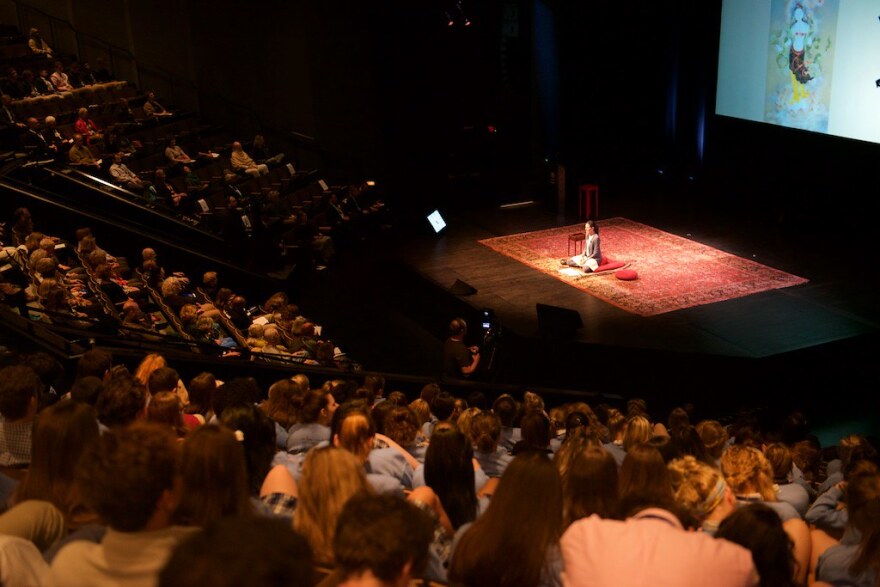The 26th annual Festival of Faiths began Wednesday.
This year’s event, organized by the Center for Interfaith Relations in Louisville, focuses on the power of storytelling.
The panel discussion “Changing Story Keepers: Millennials and Gen Zers” on Thursday, featured speakers exploring their spiritual journeys. It highlighted how younger generations are reframing faith practices to speak to their present-day realities.
“That connects to generations that are seeing stories differently, but also seeing themselves differently,” Afro-futurist filmmaker and performer storäe michele told WFPL News. “Also relating back to social justice movements, it causes them to join these movements in a way that is more authentic to who they are now."
Panelist Najeeba Syeed is the El-Hibri endowed chair at Augsburg University in Minneapolis and executive director of the school’s interfaith institute. She participated in Thursday’s panel discussion. Before the event, she told WFPL younger generations’ faith practices are examined through narrow definitions. But religion is complex and diverse.
“I think we live in a current culture and society in which we even have legal definitions of religion… [and] there are certain factors in which we have to measure what a religion is,” Syeed said. “Whether it's a scholar, whether it's the context that you live in, whether it's a nonprofit structure, they'll always be some form of defining boundaries of religion.”
Through her studies and research, Syeed has found that Millennials and Gen Zers are developing their own language and ways of expressing and understanding their religious identities — she gave the example of people connecting to religious texts through technology, specifically phone apps.
Some young people are also finding religious meaning in places outside traditional houses of worship, such as a group of young Muslims she spoke with who “felt that service was their calling” and helped out in a mosque’s food pantry to feel closer to their faith.
“There's so many ways in which we can think about who defines religion, and whose definition is acceptable to whom, but I wanted to point that out because religion is such a dynamic force already in society, not just in religious spaces, but also in secular spaces,” Syeed said, adding that common understanding of religion as an organized, hierarchical convention with a governing body doesn’t have a religious origin.
“Nowhere in the Quran, or in the Hebrew Bible, does it say, ‘And ye shall have a board of directors or an executive director’… so it’s fascinating that [it] becomes the prototypical idea of a religious community,” she continued.
Younger generations might also navigate away from religious institutions because they find them “resistant to change” or a space that represents trauma. storäe michele said Millennials and Gen Z individuals might not “see themselves reflected in those ministries,” and are finding other ways to congregate.
“If your spiritual faith or walk means that you spend your Sundays having brunch with friends, I think that that's also spiritual because, as relational beings, being able to connect with each other, to share with each other is all a part of what I think we're called to do as humans,” they said
For michele, who went to divinity school to initially become a minister, exploring their own faith and religiosity is what led them to filmmaking.
“I began to see how film is ritualistic and how film is its own ministry within itself,” they said.
They’ve also shifted toward eco-theological practices and rituals, which focus on humans’ relationship with and responsibility to the natural world, as well as learning more about Indigenous and African-based faiths and traditions, like Yoruba.
“My faith changed from just thinking about like a godhead or spirit to also looking around me to see how spirit is moving and honoring my ancestors, those that I knew and did not know, and understanding that they were also guiding my path,” michele said.
Syeed said, as the United States’ population has diversified, so has its religious makeup, and there’s a reclamation of religious practices that were disrupted by things like colonialism or migration, whether forced or voluntary.
“It's really that hybridity, for instance of whether it's an Indigenous identity and a spiritual and religious identity, and elevating those Indigenous practices to understand that they have legitimacy as religious and spiritual sources, that they're not secondary to another form of religious identity,” she said.
Syeed and michele were in conversation with Lyla June, an Indigenous musician, community organizer and scholar of Diné (Navajo), Tsétsêhéstâhese (Cheyenne) and European lineages. Michael Brandon McCormack, associate professor of Pan-African Studies and Comparative Humanities and director of the Anne Braden Institute for Social Justice Research at University of Louisville, served as moderator.
The panel was Thursday afternoon, and the festival runs through Saturday.
Sessions and panels are live streamed on the festival's website and YouTube channel. They will also be archived on YouTube.

